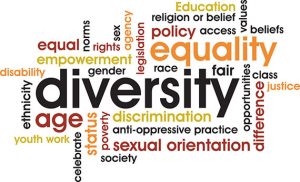Last week it was a great pleasure to attend the VC’s ‘think tank’ on equality and diversity. I was one of four opening speakers who had been invited to kick the event off with some personal reflections – my own talk was on disability and others spoke very eloquently on gender, race and LGBT issues.
“So what?” I hear you ask. “Will anything happen as a result?”. I hope so – there seemed to be a good deal of commitment in the room and a number of issues are being taken forward to Diversity Committee for consideration.

The input from the speakers seemed to suggest that, in the main part, our differences don’t make much difference, which is great. However, we were also very aware that we weren’t representative and that people’s experiences vary a lot, so we can’t be complacent. And whether it’s improving the gender balance in sciences, reducing the gender pay gap or improving our ethnic diversity, we have some brilliant people working here – putting our collective minds to it should give us a great chance of success.
What was also clear to me was that it needs us all to act – we can’t just leave it to women to fight for better gender equality, or disabled people for better access and inclusion. We should all stand up for these values and contribute where we can.
One way to do this is to get involved. Speak with your faculty Director of Diversity, or feed in ideas through the Diversity Consultative Group. We need your ideas, your feedback and your support if we are to make real progress.
Richard Boggie, Acting Assistant Director (HR Strategy)

 ere along a very long spectrum? A dodgy back, a grumbly knee, poor co-ordination, and so on. In our attempts to demonstrate compliance with the law, we in HR are guilty of labelling people as ‘disabled’ but I’m really not sure it is that helpful a box to put people in.
ere along a very long spectrum? A dodgy back, a grumbly knee, poor co-ordination, and so on. In our attempts to demonstrate compliance with the law, we in HR are guilty of labelling people as ‘disabled’ but I’m really not sure it is that helpful a box to put people in. On a good day I am barely aware of having a disability – I have the right assistive technology to do my job, my colleagues remember to let me have those notes in advance so I can contribute effectively at our meeting, the bus driver is well trained in helping me get home, the pedestrian crossing works (find out about
On a good day I am barely aware of having a disability – I have the right assistive technology to do my job, my colleagues remember to let me have those notes in advance so I can contribute effectively at our meeting, the bus driver is well trained in helping me get home, the pedestrian crossing works (find out about